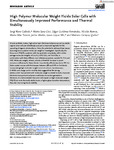High Polymer Molecular Weight Yields Solar Cells with Simultaneously Improved Performance and Thermal Stability

Use this link to cite
http://hdl.handle.net/2183/38154
Except where otherwise noted, this item's license is described as CC BY 4.0 https://creativecommons.org/licenses/by/4.0/
Collections
- Investigación (EPEF) [590]
Metadata
Show full item recordTitle
High Polymer Molecular Weight Yields Solar Cells with Simultaneously Improved Performance and Thermal StabilityAuthor(s)
Date
2024-06-26Citation
Riera-Galindo, S., Sanz-Lleó, M., Gutiérrez-Fernández, E., Ramos, N., Mas-Torrent, M., Martín, J., López-Mir, L., & Campoy-Quiles, M. (2024). High Polymer Molecular Weight Yields Solar Cells with Simultaneously Improved Performance and Thermal Stability. Small. 20(26). https://doi.org/10.1002/SMLL.202311735
Abstract
[Abstract]: Simple synthetic routes, high active layer thickness tolerance as well as stable organic solar cells are relentlessly pursued as key enabling traits for the upscaling of organic photovoltaics. Here, the potential to address these issues by tuning donor polymer molecular weight is investigated. Specifically, the focus is on PTQ10, a polymer with low synthetic complexity, with number average molecular weights of 2.4, 6.2, 16.8, 52.9, and 54.4 kDa, in combination with three different non-fullerene acceptors, namely Y6, Y12, and IDIC. Molecular weight, indeed, unlocks a threefold increase in power conversion efficiency for these blends. Importantly, efficiencies above 10% for blade coated devices with thicknesses between 200 and 350 nm for blends incorporating high molecular weight donor are shown. Spectroscopic, GIWAXS and charge carrier mobility data suggest that the strong photocurrent improvement with molecular weight is related to both, improved electronic transport and polymer contribution to exciton generation. Moreover, it is demonstrated that solar cells based on high molecular weight PTQ10 are more thermally stable due to a higher glass transition temperature, thus also improving device stability.
Keywords
Molecular weight
Organic photovoltaics
Stability
Thickness tolerance
Upscaling
Organic photovoltaics
Stability
Thickness tolerance
Upscaling
Editor version
Rights
CC BY 4.0 https://creativecommons.org/licenses/by/4.0/
ISSN
1613-6829
1613-6810
1613-6810






